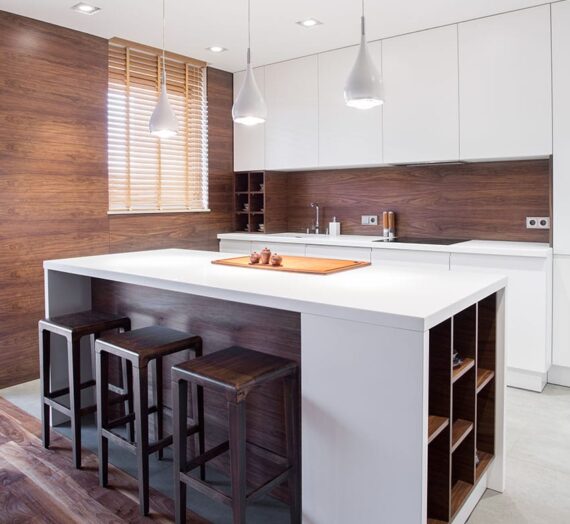Starting a home remodeling project can be a mix of anticipation and intimidation. The prospect of transforming your living space can be thrilling, but the process often involves a considerable investment of time, money, and effort. Proper planning and management are crucial for ensuring a successful and stress-free commercial remodeling experience.
Home remodeling project tips
In this guide, we will discuss essential tips for managing your home remodeling project, from setting realistic goals to selecting the right contractor.
Set Realistic Goals and Priorities
Before starting your remodeling project, it’s crucial to establish clear and realistic goals. Consider the reasons for the remodel, whether it’s to improve the functionality of your space, increase your home’s value, or enhance its aesthetic appeal. Once you have identified your objectives, prioritize the various aspects of the project based on your needs and budget.
Develop a Comprehensive Budget
A well-defined budget is essential for managing your remodeling project. Calculate the total cost, including materials, labor, permits, and any other expenses associated with the project. It’s also advisable to include a contingency fund (usually around 10-20% of the total budget) to cover any unexpected costs or changes in scope. This will help you avoid financial surprises and ensure a smoother remodeling process.
Create a Detailed Plan and Timeline
To prevent delays and ensure your project stays on track, it’s important to have a detailed plan and timeline in place. Work with your home addition contractors McLean to develop a detailed plan, outlining the various stages of the remodel and their corresponding timelines. This will help you monitor progress, identify potential issues, and make informed decisions throughout the project.
Research and Choose the Right Contractor
The success of your remodeling project largely depends on the expertise and professionalism of your contractor. Do your research, ask for recommendations, and read reviews to find a reputable and experienced contractor. Verify their licensing and insurance, request references, and obtain written estimates before making a final decision. Remember, communication and trust are vital in a successful working relationship, so choose a contractor who is responsive and easy to work with.
Obtain Necessary Permits
Depending on the scope and location of your remodeling project, you may be required to obtain permits from your local government. Obtaining these permits is crucial to make sure that your project meets both building codes and safety regulations. Work with your contractor to identify any necessary permits and submit the required documentation to avoid potential fines or delays.
Establish a Clear Communication Strategy
Effective communication is key to a successful remodeling project. Establishing a clear communication strategy with your contractor, including regular progress updates and discussions about any changes or issues that may arise. This will help you stay informed, make timely decisions, and ensure that your project runs smoothly.
Plan for Disruptions and Inconveniences
Home remodeling projects can often cause disruptions and inconveniences to your daily life. Plan ahead for any potential disruptions, such as noise, dust, or limited access to certain areas of your home. You may need to make temporary arrangements for living, cooking, or storage during the remodeling process. Discuss these potential inconveniences with your contractor and develop a plan to minimize their impact on your daily routine.
Be Prepared for Changes in the Scope
Changes in scope are not uncommon in remodeling projects, whether due to unforeseen issues or adjustments to your initial plan. Be prepared to make decisions and adapt your budget and timeline as needed. Maintain open communication with your contractor and stay involved in the decision-making process to ensure that any changes align with your goals and priorities.
Keep Track of Expenses and Payments
Maintaining accurate records of expenses and payments is essential for staying within your budget and managing your remodeling project. Develop a system for tracking expenses, including receipts, invoices, and estimates. This will help you monitor your spending and make informed decisions about any potential changes or adjustments to the project. Additionally, set up a payment schedule with your contractor, making sure to tie payments to specific milestones or stages of completion. This will help ensure that work is progressing as planned and that you are paying for completed work.
Stay Organized
Staying organized throughout your remodeling project can help minimize stress and ensure a smooth process. Keep all project-related documents, such as contracts, permits, and receipts, in a designated folder or digital file. Maintain a calendar with important dates and deadlines, and develop a checklist of tasks and responsibilities to keep track of progress.
Celebrate the Completion of Your Project
Once your remodeling project is complete, take the time to celebrate your achievement and enjoy your transformed space. Organize a housewarming party, take before and after photos, or simply spend time appreciating the improvements you have made to your home. Remember that a successful remodeling project is not only about the end result but also the process and effort that went into achieving your goals.
Why is hope remodeling important?
Home remodeling is important for several reasons, contributing to the overall value, comfort, and functionality of your living space. One of the primary reasons homeowners undertake remodeling projects is to improve the aesthetics of their home. Designing and keeping your living space up-to-date can improve the overall atmosphere of your home and make it more pleasant and inviting for both you, your family, and any visitors.
Additionally, home remodeling can contribute to increased energy efficiency, resulting in lower utility bills and a reduced environmental impact. Updating your home’s insulation, windows, and doors, or incorporating energy-efficient appliances and fixtures can lead to significant savings on energy costs while also reducing your carbon footprint.
Remodeling is done to improve the functionality of your living space, which is a significant reason. As time passes or as your family grows, you may feel that your current home no longer satisfies your needs. Remodeling projects, such as creating an open-concept living area, adding storage, or updating the kitchen or bathrooms, can help adapt your home to better suit your needs and lifestyle.
Home remodeling is also crucial for maintaining and improving the overall value of your property. A home that is in good condition and regularly updated is more likely to receive higher offers and sell faster compared to a property that requires major repairs or updates. By investing in remodeling projects that improve the appearance and functionality of your home, you can increase its market value and appeal to potential buyers.
Conclusion
Managing a home remodeling project can be a complex and challenging endeavor, but with proper planning, organization, and communication, it can be a rewarding and enjoyable experience. By following the tips outlined in this guide, you can successfully navigate the remodeling process, ensuring a stress-free and successful transformation of your living space. You begin your condo remodel DC project with confidence and excitement, because your ideal home is within reach.



